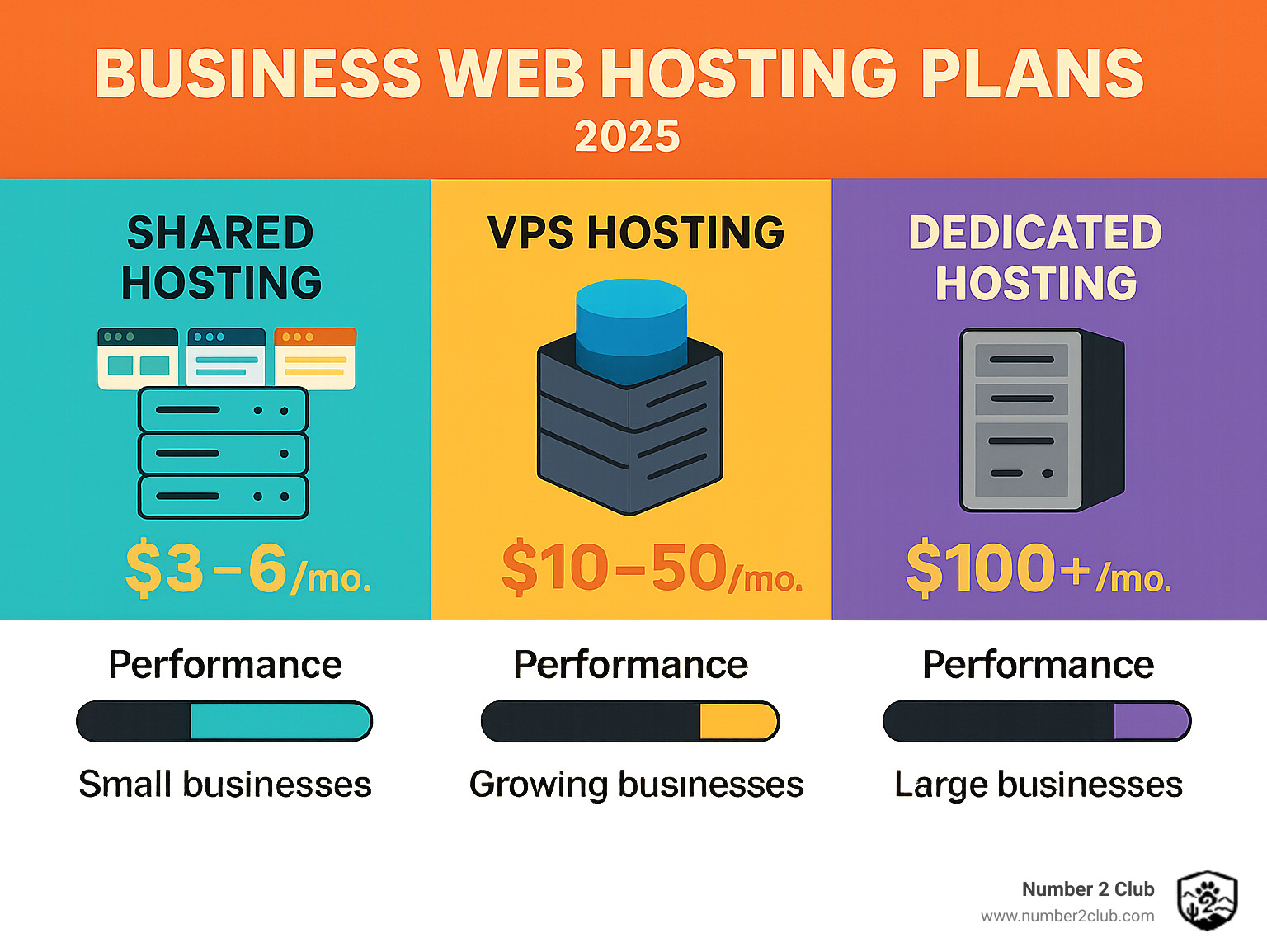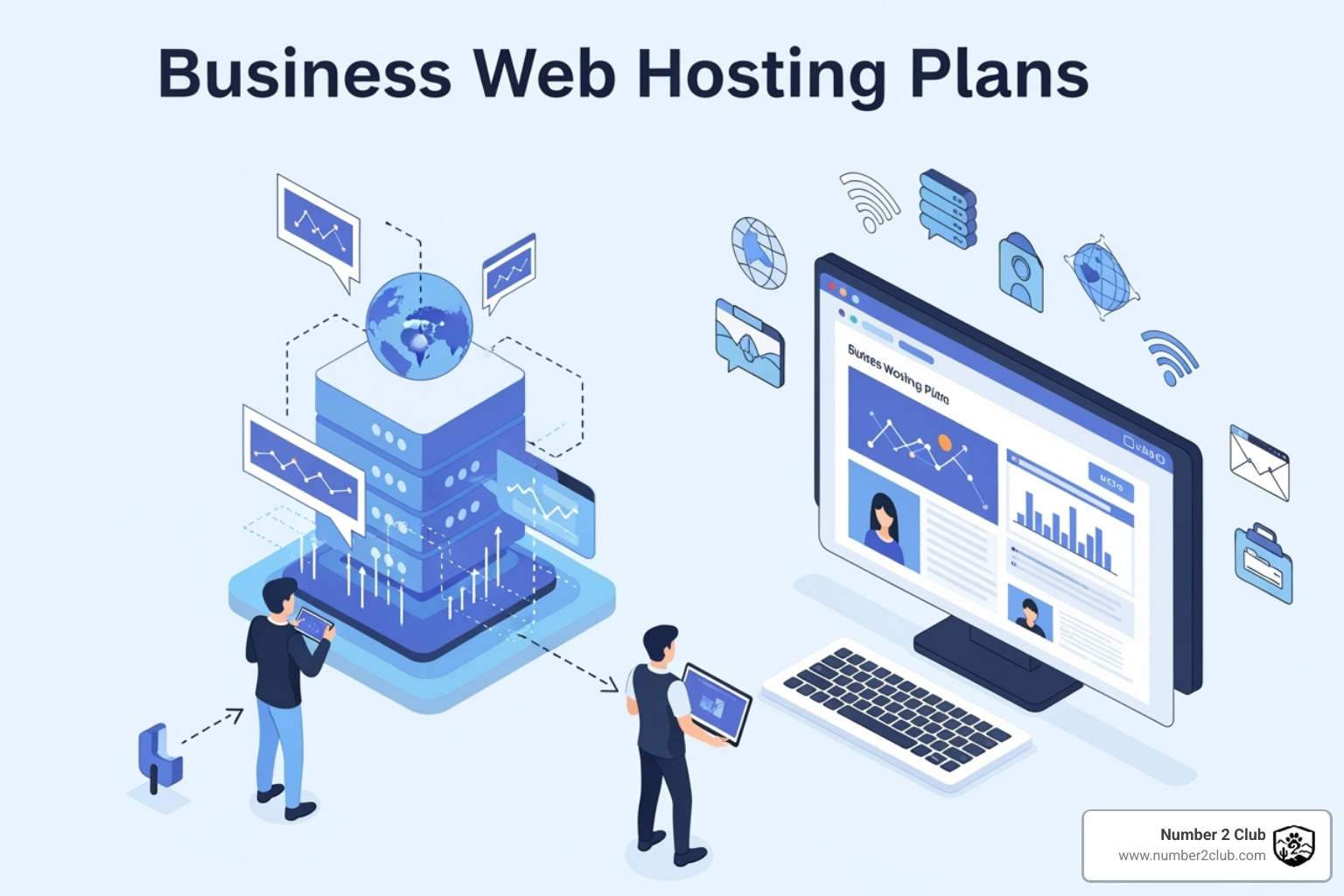Web Hosting Plans That Mean Business
Why Business Web Hosting Plans Are Essential for Your Company's Success
Business web hosting plans are specialized hosting solutions designed to meet the unique needs of companies, offering improved performance, security, and support compared to basic personal hosting. These plans typically include features like guaranteed uptime, professional email accounts, SSL certificates, and scalable resources to handle growing website traffic.
Key differences between business and personal hosting:
- Performance: Business plans offer more server resources (CPU, RAM, storage) and faster loading times
- Security: Improved protection with SSL certificates, malware scanning, and daily backups
- Support: Priority customer service with 24/7 availability and faster response times
- Scalability: Easy upgrades to handle increased traffic and business growth
- Professional features: Custom email addresses, e-commerce tools, and advanced analytics
The hosting landscape offers several types of business solutions. Shared hosting starts around $3-6 per month and works well for small businesses with basic needs. VPS hosting ranges from $10-50 monthly and provides dedicated resources for growing companies. Dedicated servers cost $100+ per month but deliver maximum performance for high-traffic sites.
As research shows, "if your site is down, clients cannot find you or access your products/services, potentially leading to lost business and customer loyalty." This makes choosing the right hosting plan crucial for maintaining your online presence and protecting your reputation.
Security features are non-negotiable for business hosting. Essential protections include SSL certificates for encrypted data transmission, daily automatic backups to prevent data loss, and malware scanning to detect threats. Many providers also offer DDoS protection and Web Application Firewalls (WAF) to safeguard against cyber attacks.
I'm Joseph Lopez nc, and through my experience building and maintaining professional websites for businesses across Arizona's West Valley, I've seen how the right business web hosting plans can make or break a company's online success. My work with Number 2 Club and other local businesses has taught me that reliable hosting is the foundation of any effective digital presence.

Understanding the Core Types of Business Web Hosting
Choosing the right web hosting plan is akin to selecting the perfect foundation for your business's online home. It's not just about having a website; it's about ensuring it performs flawlessly, remains secure, and can grow with your ambitions. Our research into business web hosting plans reveals that the ideal choice depends heavily on your current needs, anticipated growth, budget, and technical expertise. Let's explore the core types:
Shared Hosting: The Economical Starting Point
Shared hosting is often the first step for new businesses. Imagine it like an apartment building: you have your own space but share the building's resources (like electricity and water) with other tenants. In web hosting, this means your website shares server resources like CPU, RAM, and disk space with other websites on the same physical server.
This makes shared hosting the most economical option, typically starting around $3-10 per month. It's easy to use, often coming with user-friendly control panels, making it ideal for those without extensive technical knowledge. However, sharing resources has limitations. A traffic surge on another site on your server could impact your site's performance. This is a common pitfall, as some hosting companies might place too many customers on one server to maximize profits. Even plans with "unmetered bandwidth" often have fair use policies that limit resource usage to a certain percentage for a short time. While great for new businesses or sites without massive traffic, it may not suit high-demand applications. It's the best starting point for beginners due to its low cost and easy upgrade path.
Virtual Private Server (VPS) Hosting: The Balanced Upgrade
When your business outgrows shared hosting, a Virtual Private Server (VPS) is the next step, like moving into a townhouse. You still share a physical server, but it's partitioned into independent virtual machines, each with its own dedicated resources (CPU, RAM, storage). This means you get guaranteed resources, and other websites on the server won't directly affect your performance.
VPS hosting balances the affordability of shared hosting with the power of a dedicated server, making it excellent for growing businesses or e-commerce sites needing more control. Prices typically range from $10-$50 per month. With a VPS, you have more control over your server environment, including installing custom software. It's a significant upgrade for websites with increased traffic or those requiring more robust performance. Many VPS plans are perfect for high-traffic WordPress sites or advanced e-commerce platforms, offering a perfect blend of power and affordability.
Dedicated Server Hosting: The Ultimate in Power and Control
For businesses demanding maximum performance, security, and control, a dedicated server is the pinnacle of web hosting. This is like owning a private mansion—you lease an entire physical server exclusively for your website. All its resources are yours alone, ensuring unparalleled speed and stability.
Dedicated servers are ideal for high-traffic websites, large enterprises, or mission-critical applications where downtime is not an option. This exclusivity comes with a higher cost, often exceeding $100 per month, and typically requires technical expertise to manage. However, the benefits are immense: complete control over the server, robust security, and the ability to handle massive traffic volumes. If your business processes large amounts of data or runs complex applications, dedicated hosting provides the raw power you need. This level of control is invaluable for businesses pushing the boundaries of their online presence.
Managed WordPress Hosting: The Hands-Off Solution
Given that WordPress powers a majority of CMS-based websites, specialized Managed WordPress hosting has become incredibly popular. This option is custom for WordPress sites, with the provider handling all technical aspects of running and maintaining your site. Think of it as a concierge service for your website.
With Managed WordPress hosting, you can expect automatic WordPress updates, improved security, daily backups, and performance optimization tuned for WordPress. This hands-off approach frees you to focus on your business, not server maintenance. Many top providers offer excellent managed WordPress solutions. This hosting is perfect for businesses that rely on WordPress and want to ensure their site is always running optimally and securely without technical hassle. It’s like a custom-custom suit, designed to fit just right and ensure your WordPress site performs at its peak. For businesses in Litchfield Park, AZ, Goodyear, AZ, Verrado, AZ, and Buckeye, AZ, this can be a game-changer.
Easiest WordPress Page Builder
Key Features to Compare in Business Web Hosting Plans
Beyond simply choosing a hosting type, understanding the specific features and specifications included in business web hosting plans is paramount. These details directly impact your website's performance, security, and overall reliability. We've identified the core elements that every business should scrutinize when comparing options.

Essential Specifications for Your Business
When evaluating business web hosting plans, we look beyond the glossy marketing and dive into the nuts and bolts of what you're actually getting.
- Storage Type and Amount: Storage is more than capacity; its type matters. Modern NVMe storage offers superior speed and minimal latency compared to traditional SSDs. While SSDs are fast, NVMe takes performance to another level, which is crucial for dynamic business websites. Storage amounts vary widely, so ensure the plan you choose aligns with your website's size and anticipated content.
- Bandwidth: Many providers advertise "unmetered bandwidth," but it's important to read the fine print. "Unmetered" typically means you're not charged by the gigabyte, but providers still have fair usage policies. For example, you might be limited to not exceeding a certain percentage of system resources for a specific duration. Always check the terms of service.
- Number of Websites: Consider how many websites you plan to host. Plans can range from supporting a single website to multiple sites, or even hundreds.
- Professional Email Accounts: A professional email address matching your domain (e.g., info@yourbusiness.com) is crucial for credibility. Most business plans include this, with the number of available mailboxes varying by plan.
- Control Panel: A user-friendly control panel simplifies website management. cPanel is a widely recognized industry standard, offering intuitive tools for file management, database creation, and email setup. Some providers offer their own custom control panels, which can also be very easy to use.
Performance Features That Drive Growth
In today's digital world, website performance isn't a luxury; it's a necessity. Slow loading times can deter visitors, hurt your search engine rankings, and ultimately impact your bottom line.
- Content Delivery Network (CDN): A CDN is a network of servers located around the globe. When a visitor accesses your site, the CDN delivers content from the closest server, dramatically reducing load times. Many top hosting providers integrate CDN services. This is vital for businesses with a geographically diverse customer base, like those in Litchfield Park looking to reach customers across the country.
- Optimized Servers: Providers use various technologies to boost server performance. Web servers like LiteSpeed and NGINX are popular choices known for their speed and efficiency.
- Server-level Caching: Caching stores frequently accessed data so it doesn't have to be retrieved from the server every time. Built-in caching mechanisms can significantly speed up content delivery.
- Global Data Centers: Providers with a global network of data centers can offer high uptime and speedy content delivery to visitors worldwide.
- Page Load Speed: All these features contribute to one critical metric: page load speed. Faster sites improve user experience, reduce bounce rates, boost SEO rankings, and increase conversion rates. Look for providers that emphasize blazing-fast website performance.
Critical Security Measures for Business Web Hosting Plans
For any business, protecting your website and customer data is non-negotiable. Cyber threats are constantly evolving, making robust security measures a foundational requirement for any reliable business web hosting plan.
- Free SSL Certificates: An SSL certificate encrypts the connection between your website and visitors' browsers, protecting sensitive data. It builds trust and is a factor in search rankings. Most reputable providers offer free SSL certificates, sometimes including Wildcard SSL for multiple subdomains.
- Daily Automatic Backups: Data loss can be catastrophic. Daily automatic backups ensure a recent copy of your website is always available for restoration after a hack, deletion, or server failure. This is a crucial feature highlighted by many top providers.
- Malware Scanning: Regular malware scanning proactively detects and removes malicious software that could compromise your site. Many providers integrate this into their security offerings.
- Web Application Firewall (WAF): A WAF acts as a shield, filtering traffic to block common web-based attacks like SQL injection and cross-site scripting. Look for plans that include a WAF.
- DDoS Protection: Distributed Denial of Service (DDoS) attacks try to overwhelm your website with traffic. Built-in DDoS protection mitigates these attacks, ensuring your site remains online.
- Privacy Protection: Features like IP and country blocking allow you to restrict access from suspicious locations, adding another layer of security.
- PCI Compliance: For e-commerce businesses, Payment Card Industry Data Security Standard (PCI DSS) compliance is critical. Some hosts offer PCI-certified solutions. Alternatively, using third-party payment processors like PayPal, Square, or Stripe simplifies compliance by keeping sensitive credit card data off your server.
Understanding your rights with ICANN
The Business Side of Hosting: Support, Pricing, and Scalability
Beyond the technical specifications, the practical aspects of customer support, pricing transparency, and future scalability are crucial considerations for any business. These elements significantly impact your long-term satisfaction and the ability of your online presence to adapt and grow.
Evaluating Customer Support and Uptime Guarantees
When your website is down, every minute can mean lost revenue and damaged reputation. That's why top-notch customer support and rock-solid uptime guarantees are non-negotiable for business web hosting plans.
- 24/7 Availability: Support should be available whenever you need it. Most reputable providers offer 24/7 support via live chat, phone, or tickets.
- Channels and Response Time: The speed and quality of support can vary. Look for providers that boast fast response times and knowledgeable agents. Being able to reach a real person quickly is vital, especially for businesses in different time zones.
- Uptime Guarantee: The industry standard for reliability is a 99.9% uptime guarantee, meaning your website should be accessible virtually all the time. While 100% uptime is an aspiration, a strong Service Level Agreement (SLA) ensures you're compensated if a provider fails to meet its guarantee. Uptime is arguably the most important factor for business hosting, as any downtime directly impacts your ability to serve customers.
- Money-Back Guarantee: Many providers offer a 30-day money-back guarantee, allowing you to try their service risk-free. This demonstrates confidence in their offerings and provides peace of mind.
Decoding Hosting Prices: Initial Deals vs. Long-Term Cost
The pricing of business web hosting plans can often seem like a maze, with enticing introductory offers that sometimes obscure the true long-term cost. We always advise looking beyond the initial discount.
- Introductory Discounts: It's common to see significant savings for new customers, especially on longer-term contracts. Many providers offer steep discounts for the first term, which are great for getting started at a low cost.
- Renewal Rates: This is where many businesses get a sticker shock. Renewal rates are typically much higher than the introductory prices. Always check the renewal rate upfront to understand the true long-term cost.
- Free Domain Offers: Many plans include a free domain name for the first year. However, be aware of the terms, as there may be a non-refundable domain fee if you cancel the hosting plan early.
- Hidden Fees: Always read the terms of service carefully to identify potential hidden fees, such as setup fees, migration fees, or charges for exceeding "unmetered" limits.
- Contract Length: Opting for longer contract terms (e.g., 24 or 36 months) usually secures the lowest monthly rate. While it's a larger upfront investment, it can lead to substantial savings over time.
Tips for Writing Great Posts That Increase Your Site Traffic
Planning for the Future: Migration and E-commerce Considerations
As your business grows, your hosting needs will evolve. Planning for future scalability and understanding e-commerce specific requirements are vital.
- Website Migration Process: Moving an existing website to a new host can seem daunting, but many providers make it easy. Look for hosts that offer free or low-cost migration services, often boasting "zero downtime" transfers. They handle the technical heavy lifting, ensuring your site moves smoothly. Always confirm the details of the migration service before committing.
- Scalability Options: A good business web hosting plan should offer clear upgrade paths. You should be able to easily boost your resources (CPU, RAM, storage) as your traffic grows. Some providers even offer temporary resource boosts for traffic surges. This flexibility prevents you from being stuck on an underperforming plan.
- PCI Compliance and Secure Payment Processing: For e-commerce businesses, PCI DSS compliance is a legal and ethical necessity to ensure credit card data is handled securely. Using third-party payment processors like PayPal, Stripe, or Square is often the simplest route to compliance. Alternatively, if you process payments directly on your server, ensure your hosting provider offers PCI-certified solutions.
- Key Considerations for E-commerce Hosting:
- PCI DSS compliance
- Dedicated SSL certificates
- Robust security features (WAF, DDoS protection, malware scanning)
- Scalable resources to handle traffic spikes
- High performance (NVMe storage, CDN) for fast checkout
- Daily backups to protect order and customer data
- One-click e-commerce platform installs
- Reliable 24/7 customer support
- Dedicated IP address
- Integrated e-commerce features like shopping carts and inventory management.
Frequently Asked Questions about Business Web Hosting Plans
We've compiled some of the most common questions we hear from businesses about web hosting to provide clear, concise answers.
What’s the difference between web hosting and a domain name?
This is a fundamental question. Think of it this way: your domain name is your website's street address on the internet (e.g., yourbusiness.com). It's what people type into their browser to find you. Web hosting is the actual plot of land or physical space where your website's files (images, text, code) are stored. Web hosting provides the server space that makes your site accessible when someone enters your domain name. You need both to have a live website.
How much traffic can a business hosting plan handle?
The amount of traffic a business web hosting plan can handle varies based on the hosting type and allocated resources. Shared hosting is generally suited for low-to-moderate traffic, often up to around 50,000 visitors per month. Beyond this, you might encounter performance issues due to shared resources.
VPS and Dedicated hosting plans are designed for significantly more traffic. VPS plans can support hundreds of thousands of visitors, while dedicated servers are built for millions of visitors and high-demand applications. Some higher-tier shared or VPS plans are rated for specific traffic levels, such as 200,000 or 400,000 visits per month. Always consider your anticipated traffic and choose a plan with room to grow.
How easy is it to migrate an existing website to a new host?
Migrating an existing website to a new business web hosting plan is often easier than businesses anticipate. Many hosting providers offer free or low-cost migration services to make the process seamless. They typically handle the technical transfer of your website files, databases, and configurations from your old host to their servers, aiming for minimal or zero downtime. Many providers explicitly advertise free migration services, sometimes promising to transfer your site with no downtime at all. Before signing up, always confirm the details of their migration service to ensure a smooth transition.
Conclusion: Choosing the Right Plan for Your Success
Selecting the right business web hosting plan is a foundational decision that impacts your company's online presence, performance, and security. We've explored the various types of hosting – from the economical Shared hosting, through the balanced power of VPS, to the ultimate control of Dedicated servers, and the specialized ease of Managed WordPress. Each has its unique strengths, suited to different business sizes, technical expertise levels, and traffic demands.
We've also highlighted the critical features to compare: from essential specifications like NVMe storage and unmetered bandwidth to performance boosters like CDNs and optimized servers, and indispensable security measures such as SSL certificates, daily backups, and DDoS protection. Furthermore, we've digd into the practicalities of customer support, pricing structures (beware of renewal rates!), and the vital considerations for website migration and e-commerce PCI compliance.
For businesses in Litchfield Park, AZ, Goodyear, AZ, AZ, Verrado, and Buckeye, AZ, a reliable host is not just about being online; it's about optimizing your local and broader online presence to effectively reach your audience. The right hosting choice provides the speed, reliability, and security necessary to build customer trust and support your growth.
The best business web hosting plan is one that balances performance, security, and budget, while offering the flexibility to scale as your business flourishes. It's about future-proofing your online foundation so you can focus on what you do best: running your business. We at Number 2 Club understand these needs deeply, and we're committed to helping businesses thrive online.












